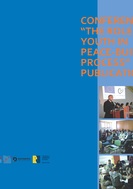Uloga mladih u izgradnji mira / Role of Youth in Peace-building Process
Role of Youth in Peace-building Process
Editor: Lovorka Bačić
Centre for Peace Studies, Zagreb, 2009
The role of youth in peace-building process is an extremely valuable issue to discuss and reflect on in the context of social development. The youth represents a large part of the world population and therefore poses a number of challenges and opportunities. Development of our societies requires all possible economic, educational, intellectual and sustainable resources that youth can contribute to.
Together with our partners - the Croatian Youth Network, the Institute for Social Research, Documenta – Center for Dealing with the Past and the Spanish Youth Council, we have been implementing activities within a year-long project called ‘Youth and Peace-building’. It is our goal to mainstream peace and peace-building in the education system of the Republic of Croatia as well as into the strategies and policies targeting youth at all local and national levels.
In order to learn from experiences of other countries and societies, we organized the conference ‘The Role of Youth in Peace-building’ directed to exchange of knowledge and experience in the areas related to broader corpus of peace-building topics, such as understanding and transforming conflict, dealing with the past and peacebuilding itself.
Fifty participants from across EU, Euro-Mediterranean and Western Balkan countries were provided an opportunity to initiate dialogue among neighboring and distant cultures and to discuss issues related to peace-building and the role of youth in these processes, enhancing cooperation among institutions and NGO s as well as to discuss and develop recommendations regarding topics that would be advocated in national youth policies and strategies and other broader policy strategies. The conference content was summarized and reflected on in this publication.
The conference “Role of Youth in Peace-building Process” and this publication were supported by European Commision, Krapinsko-zagorska County, Zagorje Development Agency and National Foundation for Civil Society Development.




